Virginia Tech research program confirms presence of invasive insect in Senegal

A Virginia Tech-managed research program, the Integrated Pest Management Collaborative Research Support Program, has confirmed the presence of Tuta absoluta in Senegal, the first confirmation of the insect’s presence in that country.
Tuta absoluta is an invasive tomato leafminer native to South America. “The insect affects the ability of thousands, and possibly millions, of small farmers to grow healthy tomato crops,” says Rangaswamy Muniappan, the program’s director. Tuta causes damage primarily to tomato but could also affect other crops, making it a risk to food security and agricultural production in countries where it is found.
The confirmation was made possible through efforts of scientists at Tech, Senegal’s Direction de la Protection des Végétaux (Crop Protection Agency), the Institut Sénégalais de Recherche Agricole (Senegalese Institute for Agricultural Research), and the U.S. Department of Agriculture’s Animal and Plant Health Inspection Service.
The insect was first identified outside of South America in Spain in 2006 and has spread to other Mediterranean and European countries, North Africa, and the Middle East. Now that it has reached sub-Saharan Africa, there are no natural barriers to its spread across the continent.
The Tuta larvae primarily cause damage to leaves of tomato plants, although they sometimes burrow into the fruit. The pest’s feeding results in decreased production, decreased fruit quality, and sometimes 100 percent damage to the plant.
Where the pest has been detected, associated costs with insecticide-based management have substantially increased. Further, reports have shown that the pest has developed resistance to certain insecticides.
According to Douglas G. Pfeiffer, professor of entomology in the College of Agriculture and Life Sciences and principal investigator for the program’s project in West Africa, “We now must address how to deal with this pest in our region in an appropriate way. We’ll start with monitoring and educational efforts aimed both at farmers and plant protection specialists.”
The program is working to develop suitable tactics to control the pest and will eventually incorporate the recommendations into its tomato package in Senegal. “Packages” refer to a suite of holistic tactics that may be used to control an insect pest and plant diseases for a specific crop. The packages use integrated pest management, an approach that reduces pest damage without harming the environment. Further, by helping Senegalese tomato growers control the pest, the program helps slow the pest’s spread into additional African countries.
“Invasive pests have the potential to disrupt successful integrated pest management programs the world over, and Tuta is no exception,” says Pfeiffer.
The program, funded by the U.S. Agency for International Development and managed by the Office of International Research and International Development at Virginia Tech, operates in 17 countries in six different tropical regions of the world, encompassing about one-third of the world’s population. It has developed several economical, ecologically friendly, and effective alternate technologies that reduce the use of pesticides and combat food insecurity in the developing world.
Dedicated to its motto, Ut Prosim (That I May Serve), Virginia Tech takes a hands-on, engaging approach to education, preparing scholars to be leaders in their fields and communities. As the commonwealth’s most comprehensive university and its leading research institution, Virginia Tech offers 240 undergraduate and graduate degree programs to more than 31,000 students and manages a research portfolio of $513 million. The university fulfills its land-grant mission of transforming knowledge to practice through technological leadership and by fueling economic growth and job creation locally, regionally, and across Virginia.




